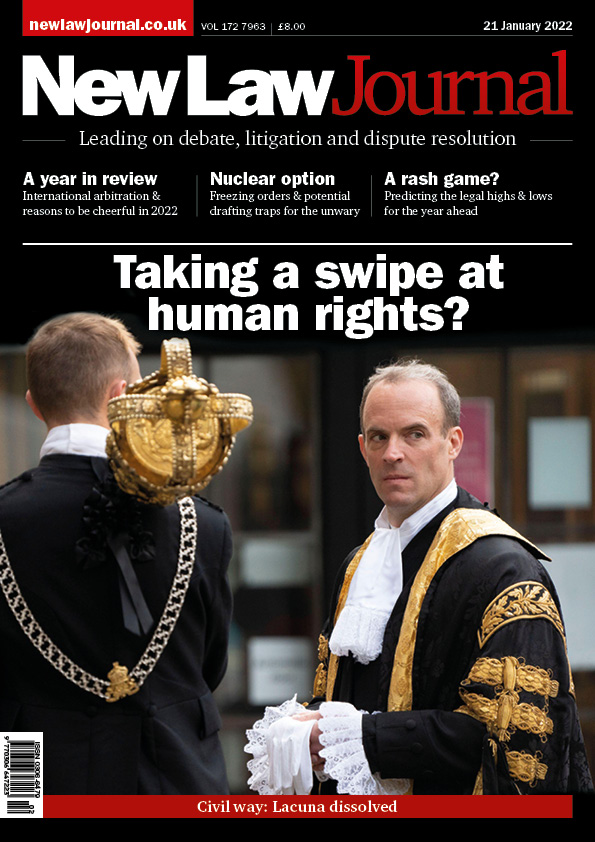THIS ISSUE

Helen Pamely considers the effects of imposter syndrome in the legal world
Michael L Nash explores the secretive history surrounding the sealing of royal wills
Fiona Lyon sets out the process for adopting both within the UK & overseas
Stewart Hey & Simon Heatley return to consider some potential drafting traps for the unwary
It is time for the UK government to stop looking inward & restore its place as a global human rights champion, says Geoffrey Bindman
Nicholas Dobson analyses a key Supreme Court decision on capacity to consent to sexual relations
Possessions and Covid; More inquest legal aid; New contempt forms; Possession defence test; Dissolved companies caught
Reasons (for claimants) to be cheerful: Donny Surtani assesses the past year in international arbitration
A rash game? David Greene reflects on recent events & predicts the legal highs & lows in the year ahead
MOVERS & SHAKERS

Jackson Lees Group—Jannina Barker, Laura Beattie & Catherine McCrindle
Firm promotes senior associate and team leader as wills, trusts and probate team expands

Asserson—Michael Francos-Downs
Manchester real estate finance practice welcomes legal director

McCarthy Denning—Harvey Knight & Martin Sandler
Financial services and regulatory offering boosted by partner hires
NEWS
The cab-rank rule remains a bulwark of the rule of law, yet lawyers are increasingly judged by their clients’ causes. Writing in NLJ this week, Ian McDougall, president of the LexisNexis Rule of Law Foundation, warns that conflating representation with endorsement is a ‘clear and present danger’
The Supreme Court has drawn a firm line under branding creativity in regulated markets. In Dairy UK Ltd v Oatly AB, it ruled that Oatly’s ‘post-milk generation’ trade mark unlawfully deployed a protected dairy designation. In NLJ this week, Asima Rana of DWF explains that the court prioritised ‘regulatory clarity over creative branding choices’, holding that ‘designation’ extends beyond product names to marketing slogans
From cat fouling to Part 36 brinkmanship, the latest 'Civil way' round-up is a reminder that procedural skirmishes can have sharp teeth. NLJ columnist Stephen Gold ranges across recent decisions with his customary wit
Digital loot may feel like property, but civil law is not always convinced. In NLJ this week, Paul Schwartfeger of 36 Stone and Nadia Latti of CMS examine fraud involving platform-controlled digital assets, from ‘account takeover and asset stripping’ to ‘value laundering’
Lasting powers of attorney (LPAs) are not ‘set and forget’ documents. In this week's NLJ, Ann Stanyer of Wedlake Bell urges practitioners to review LPAs every five years and after major life changes







